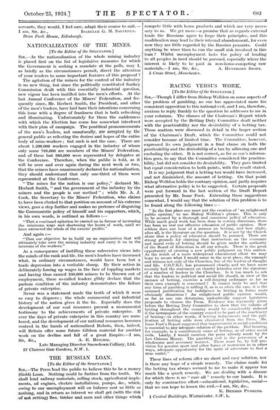NATIONALIZATION OF THE MINES.
[To the Editor of the SPECTATOR.]
Sin,—As the nationalization of the whole mining industry is placed first on the list of legislative measures for which the Government is seeking a mandate at the polls, may I, as briefly as the circumstances permit, direct the attention of your readers to some important features of this proposal ?
The agitation of the miners for the control of the industry is no new thing, but since the politically constituted Sankey Commission dealt with this essentially industrial question, new vigour has been instilled into the men's efforts. At the last Annual Conference of the Miners' Federation, and fre- quently since, Mr. Herbert Smith, the President, and other of the men's leaders, have laid bare their intentions concerning this issue with a 'degree of frankness that is both refreshing and illuminating. Unfortunately for them the suddenness
with which the Election has come has somewhat interfered with their phut Of campaign. The pontifical pronouncements of the men's leaders, not unnaturally, are accepted by the general public as reflecting the desires and hopes of the entire
body of mine-workers ; but such is not the case. There are about 1,200,000 workers engaged in the industry of whom only some 788,000 are members of the Miners' Federation, and of these but 386,000 were represented by delegates at the Conference. Therefore, when the public is told, as it will be over and over again during the next week or two, that the miners have unanimously declared for nationalization, they should understand that only one-third of them were represented at the Conference.
"The mines for the nation is our policy," declared Mr. Herbert Smith, "and the government of the industry by the
miners and the people is our method " ; while Mr. A. J. Cook, the Secretary to the Miners' Federation, who claims to have been elected to that position on account of his extreme 'views, goes a step further and makes no pretence of disguising the Communistic policy of himself and his supporters, which, in his own words, is outlined as follows :— " That a continual agitation be carried on in favour of increasing the minimum wage and shortening the hours of work, until we have extracted the whole of the owners' profits."
And again :-
"That our objective be to build up an organization that will ultimately take over the mining industry and carry it on in the interests of the workers."
As a consequence of instilling these subversive views into the minds of the rank and file, the men's leaders have increased what, in ordinary circumstances, would have been but a trade depression into a veritable slump. By their action in
deliberately forcing up wages in the face of toppling markets and having thus caused 100,000 miners to be thrown out of employment, these so-called leaders glibly declare that the parlous condition of the industry demonstrates the failure of private enterprise.
Never was a statement made the truth of which it were so easy to disprove ; the whole commercial and industrial history of the nation gives it the lie. Especially does the development of our coal resources present a monumental testimony to the achievements of private, enterprise. If ever the days of private enterprise in this country are num- bered, and the development of our national resources becomes centred in the hands of nationalized Robots, then, indeed, will Britain offer some future Gibbon material for another work on the decline and fall of a great Empire.—I am,
Late Managing Director Snowdown Colliery, Ltd. 57 Clarence Gate Gardens, N .W . 1.


























































 Previous page
Previous page